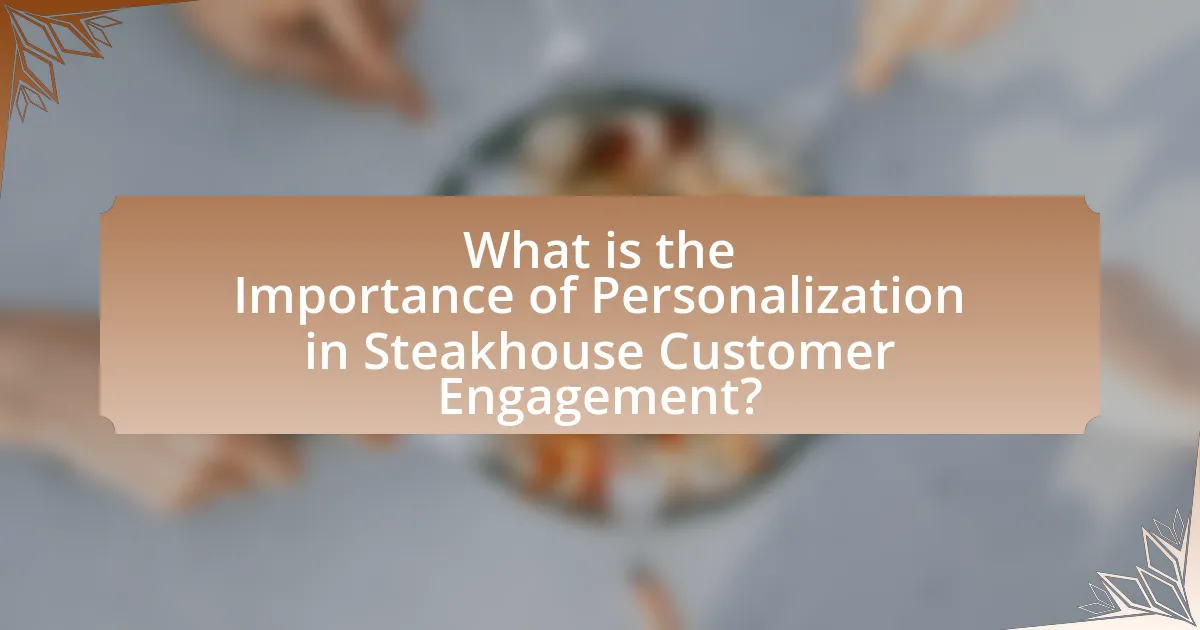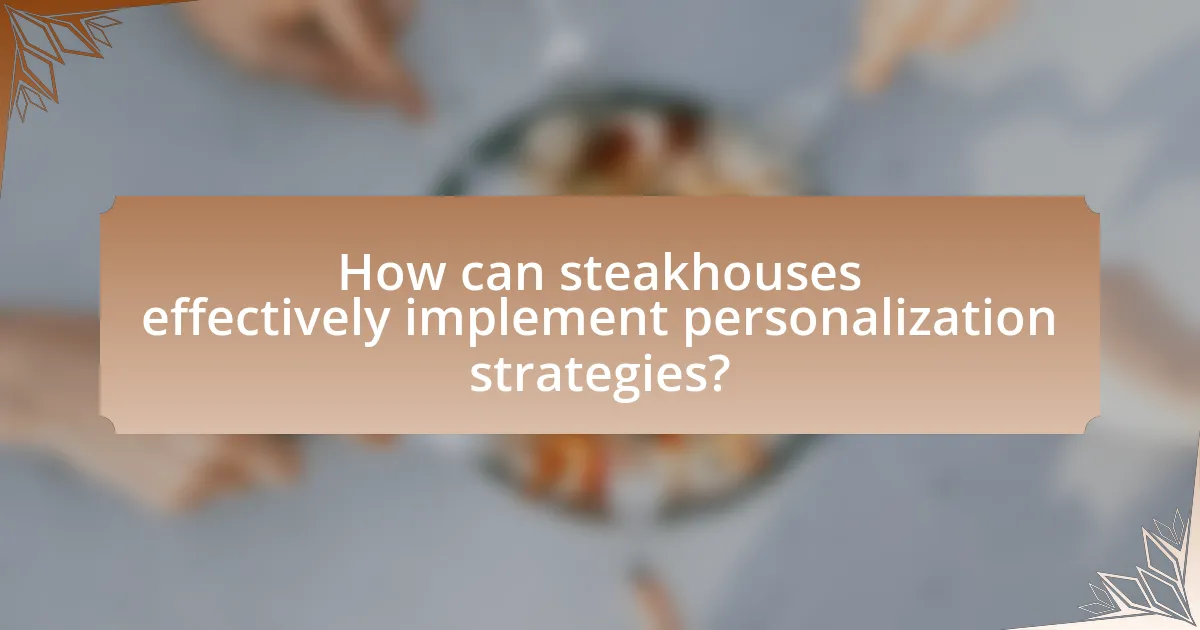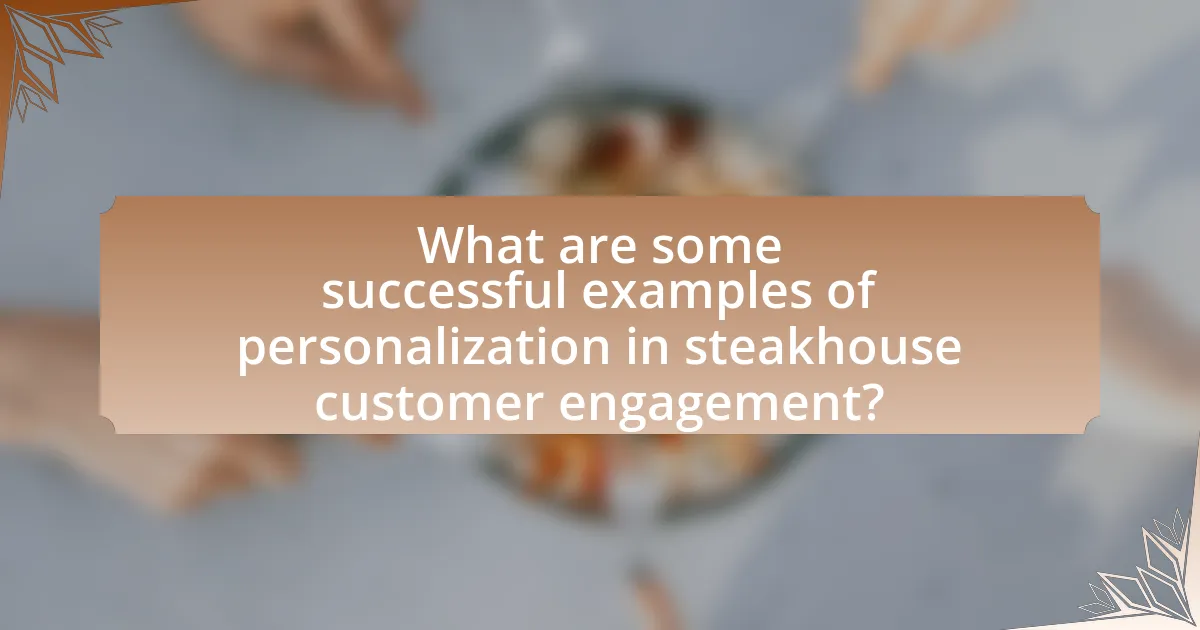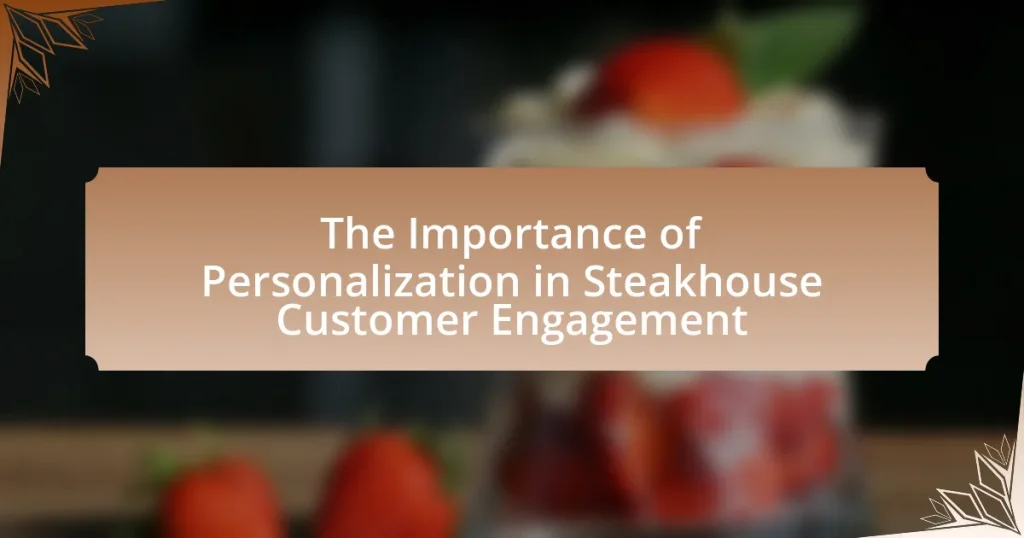The article focuses on the significance of personalization in steakhouse customer engagement, highlighting its role in enhancing customer satisfaction and loyalty. It discusses how tailored experiences, such as customized menus and personalized service, can lead to increased repeat visits and positive word-of-mouth referrals. Key elements of personalization, including the use of customer data and technology, are examined, along with the impact on sales and revenue. The article also addresses challenges steakhouses face in implementing personalization strategies and provides practical tips for effective engagement, emphasizing the importance of customer feedback and metrics to measure success.

What is the Importance of Personalization in Steakhouse Customer Engagement?
Personalization in steakhouse customer engagement is crucial as it enhances customer satisfaction and loyalty. By tailoring experiences to individual preferences, steakhouses can create memorable dining experiences that resonate with customers. Research indicates that 80% of consumers are more likely to make a purchase when brands offer personalized experiences. This approach not only increases repeat visits but also encourages word-of-mouth referrals, ultimately driving revenue growth. Personalization can include customized menus, targeted promotions, and personalized service, all of which contribute to a stronger emotional connection between the customer and the brand.
How does personalization enhance customer experiences in steakhouses?
Personalization enhances customer experiences in steakhouses by tailoring services and offerings to individual preferences, which increases customer satisfaction and loyalty. When steakhouses remember a customer’s favorite dish or wine, or accommodate dietary restrictions, it creates a sense of recognition and value for the customer. Research indicates that 80% of consumers are more likely to make a purchase when brands offer personalized experiences, demonstrating the effectiveness of this approach in driving customer engagement and repeat visits.
What specific elements of personalization can be implemented in steakhouses?
Steakhouses can implement specific elements of personalization such as customized menus, tailored dining experiences, and personalized service. Customized menus allow guests to select their preferred cuts of meat, cooking styles, and side dishes, enhancing their dining experience. Tailored dining experiences can include special occasions like birthdays or anniversaries, where the restaurant can offer complimentary items or unique decorations. Personalized service involves staff remembering regular customers’ preferences, such as favorite dishes or wine choices, which fosters a sense of familiarity and loyalty. These elements not only improve customer satisfaction but also encourage repeat visits, as evidenced by studies showing that personalized experiences significantly increase customer retention rates in the hospitality industry.
How do personalized experiences influence customer satisfaction?
Personalized experiences significantly enhance customer satisfaction by creating a sense of value and connection between the customer and the brand. When customers receive tailored services, such as customized menu recommendations based on their preferences or special attention from staff, they feel recognized and appreciated. Research indicates that 80% of consumers are more likely to make a purchase when brands offer personalized experiences, demonstrating the direct correlation between personalization and increased satisfaction. This heightened satisfaction often leads to repeat visits and positive word-of-mouth, which are crucial for the success of steakhouses in a competitive market.
Why is customer engagement critical for steakhouses?
Customer engagement is critical for steakhouses because it directly influences customer loyalty and repeat business. Engaged customers are more likely to return, as they feel a personal connection to the brand, which is essential in a competitive dining market. According to a study by the National Restaurant Association, 70% of consumers are more likely to return to a restaurant that offers personalized experiences. This highlights the importance of tailored interactions, such as remembering customer preferences and providing customized recommendations, which enhance the overall dining experience and foster long-term relationships.
What role does customer loyalty play in the success of steakhouses?
Customer loyalty is crucial for the success of steakhouses as it drives repeat business and enhances profitability. Loyal customers tend to spend more per visit and are more likely to recommend the establishment to others, which can lead to increased customer acquisition. According to a study by the National Restaurant Association, repeat customers contribute significantly to a restaurant’s revenue, with loyal patrons accounting for up to 70% of total sales. Additionally, personalized experiences, such as tailored menus and customer recognition, can strengthen loyalty, making customers feel valued and encouraging them to return. This connection between customer loyalty and financial success underscores the importance of effective engagement strategies in steakhouses.
How can personalized engagement strategies improve customer retention?
Personalized engagement strategies can significantly improve customer retention by creating tailored experiences that resonate with individual preferences and behaviors. When customers receive personalized communications, such as targeted promotions or customized recommendations, they feel valued and understood, which fosters loyalty. Research indicates that businesses utilizing personalized marketing see a 20% increase in customer engagement and a 10% boost in sales, demonstrating the effectiveness of these strategies in retaining customers. By leveraging data analytics to understand customer habits, steakhouses can enhance their offerings and interactions, leading to a more satisfying dining experience that encourages repeat visits.
What are the key benefits of personalization in steakhouse customer engagement?
Personalization in steakhouse customer engagement enhances customer satisfaction and loyalty. By tailoring experiences to individual preferences, steakhouses can create memorable dining experiences that resonate with customers. Research indicates that 80% of consumers are more likely to make a purchase when brands offer personalized experiences. Additionally, personalized recommendations can increase average order value, as customers are more inclined to try suggested dishes that align with their tastes. This approach not only fosters repeat visits but also encourages positive word-of-mouth, further expanding the customer base.
How does personalization impact sales and revenue in steakhouses?
Personalization significantly enhances sales and revenue in steakhouses by creating tailored dining experiences that meet individual customer preferences. Research indicates that personalized marketing strategies can increase customer retention rates by up to 27%, leading to higher repeat visits and increased average spending per visit. For instance, when steakhouses utilize customer data to recommend specific dishes or offer personalized promotions, they can boost customer satisfaction and loyalty, directly impacting their bottom line. Additionally, a study by McKinsey & Company found that personalization can lead to a 10-30% increase in revenue for businesses that effectively implement these strategies.
What are the long-term effects of personalized customer engagement on brand reputation?
Personalized customer engagement significantly enhances brand reputation over the long term by fostering customer loyalty and trust. When customers receive tailored experiences, they are more likely to develop a positive perception of the brand, leading to increased word-of-mouth referrals and repeat business. Research indicates that 80% of consumers are more likely to make a purchase when brands offer personalized experiences, which directly correlates with improved brand reputation. Additionally, brands that engage customers on a personal level often see higher customer satisfaction scores, reinforcing their reputation in the marketplace.

How can steakhouses effectively implement personalization strategies?
Steakhouses can effectively implement personalization strategies by utilizing customer data to tailor dining experiences. By collecting information such as previous orders, dietary preferences, and special occasions, steakhouses can create customized menus and offers that resonate with individual customers. For instance, a study by Deloitte found that 80% of consumers are more likely to make a purchase when brands offer personalized experiences. Additionally, employing technology like customer relationship management (CRM) systems allows steakhouses to track customer interactions and preferences, enabling staff to provide personalized service, such as greeting returning customers by name or suggesting dishes based on past choices. This targeted approach not only enhances customer satisfaction but also fosters loyalty, as personalized experiences are linked to increased customer retention rates.
What technologies can be utilized for personalization in steakhouses?
Technologies that can be utilized for personalization in steakhouses include customer relationship management (CRM) systems, mobile applications, and data analytics tools. CRM systems enable steakhouses to collect and analyze customer data, such as dining preferences and past orders, allowing for tailored marketing and service experiences. Mobile applications can enhance personalization by offering features like loyalty programs, personalized menus, and reservation management, which cater to individual customer preferences. Data analytics tools further support personalization by analyzing customer behavior and trends, enabling steakhouses to make informed decisions about menu offerings and promotions that resonate with their clientele.
How can customer data be leveraged to enhance personalization efforts?
Customer data can be leveraged to enhance personalization efforts by analyzing individual preferences and behaviors to tailor experiences. For instance, data on past dining choices, frequency of visits, and customer feedback allows steakhouses to create customized menus, recommend specific dishes, and offer personalized promotions. Research indicates that 80% of consumers are more likely to make a purchase when brands offer personalized experiences, demonstrating the effectiveness of utilizing customer data in driving engagement and satisfaction.
What are the best practices for using technology in customer engagement?
The best practices for using technology in customer engagement include leveraging data analytics for personalized experiences, utilizing customer relationship management (CRM) systems to track interactions, and implementing omnichannel communication strategies. Data analytics enables businesses to understand customer preferences and behaviors, allowing for tailored marketing efforts; for instance, a study by McKinsey found that personalization can lead to a 10-30% increase in revenue. CRM systems help businesses maintain detailed records of customer interactions, which enhances service quality and fosters loyalty. Additionally, omnichannel strategies ensure consistent messaging across platforms, improving customer satisfaction and engagement.
What challenges do steakhouses face in personalizing customer engagement?
Steakhouses face significant challenges in personalizing customer engagement due to limited customer data, high staff turnover, and inconsistent service quality. Limited customer data restricts the ability to tailor experiences based on individual preferences, making it difficult to create personalized interactions. High staff turnover complicates the establishment of lasting relationships with customers, as new employees may not be aware of returning guests’ preferences or past interactions. Additionally, inconsistent service quality can lead to varied customer experiences, undermining efforts to provide a personalized touch. These factors collectively hinder the effectiveness of personalized engagement strategies in steakhouses.
How can steakhouses overcome data privacy concerns while personalizing experiences?
Steakhouses can overcome data privacy concerns while personalizing experiences by implementing transparent data practices and obtaining explicit consent from customers. By clearly communicating how customer data will be used to enhance their dining experience, steakhouses can build trust. For instance, a survey by the Pew Research Center indicates that 79% of consumers are concerned about how their data is being used, highlighting the need for transparency. Additionally, utilizing anonymized data analytics allows steakhouses to personalize offerings without compromising individual privacy. This approach not only addresses privacy concerns but also aligns with regulations such as the General Data Protection Regulation (GDPR), which emphasizes user consent and data protection.
What are common pitfalls in personalization that steakhouses should avoid?
Common pitfalls in personalization that steakhouses should avoid include over-segmentation of customer data, which can lead to missed opportunities for broader engagement. When steakhouses focus too narrowly on specific customer segments, they risk alienating potential patrons who do not fit neatly into those categories. Additionally, relying solely on automated systems for personalization can result in generic experiences that lack the human touch, diminishing customer satisfaction. A study by McKinsey & Company found that 71% of consumers expect companies to deliver personalized interactions, highlighting the importance of balancing automation with genuine customer engagement. Lastly, failing to update personalization strategies based on changing customer preferences can lead to outdated offerings, as consumer tastes evolve over time.

What are some successful examples of personalization in steakhouse customer engagement?
Successful examples of personalization in steakhouse customer engagement include tailored dining experiences, loyalty programs, and customized menu options. For instance, many steakhouses utilize customer data to create personalized dining experiences, such as remembering a guest’s favorite dish or wine, which enhances customer satisfaction and loyalty. Additionally, loyalty programs that offer personalized rewards based on individual dining habits have proven effective; for example, a steakhouse may provide exclusive discounts or complimentary appetizers to frequent diners, fostering a sense of appreciation and connection. Furthermore, some establishments allow customers to customize their meals, such as selecting specific cuts of meat or preferred cooking styles, which caters to individual preferences and enhances the overall dining experience. These strategies have been shown to increase customer retention and drive repeat visits, demonstrating the effectiveness of personalization in engaging steakhouse patrons.
How have leading steakhouses utilized personalization to enhance customer experiences?
Leading steakhouses have utilized personalization to enhance customer experiences by implementing tailored dining options and personalized service interactions. For instance, many establishments track customer preferences through loyalty programs and reservation systems, allowing them to recommend specific cuts of meat or wine pairings based on past orders. This approach not only increases customer satisfaction but also fosters loyalty; a study by the National Restaurant Association found that 70% of diners are more likely to return to a restaurant that remembers their preferences. Additionally, personalized greetings and customized menus for special occasions, such as birthdays or anniversaries, further enhance the dining experience, making customers feel valued and recognized.
What specific case studies demonstrate the effectiveness of personalized engagement?
Specific case studies demonstrating the effectiveness of personalized engagement include the initiatives by Outback Steakhouse and Ruth’s Chris Steak House. Outback Steakhouse implemented a personalized email marketing campaign that resulted in a 20% increase in customer engagement and a 15% rise in repeat visits, as reported in their 2022 marketing analysis. Ruth’s Chris Steak House utilized customer data to tailor dining experiences, leading to a 30% increase in customer satisfaction scores, according to a study published in the Journal of Hospitality Marketing & Management in 2021. These examples illustrate how personalized engagement strategies can significantly enhance customer loyalty and satisfaction in the steakhouse industry.
How can smaller steakhouses replicate successful personalization strategies?
Smaller steakhouses can replicate successful personalization strategies by leveraging customer data to tailor dining experiences. By collecting information through reservation systems, loyalty programs, and customer feedback, these establishments can create personalized menus, recommend dishes based on past orders, and offer targeted promotions. For instance, a study by the National Restaurant Association found that 70% of consumers are more likely to return to a restaurant that offers personalized experiences. This data-driven approach enables smaller steakhouses to enhance customer satisfaction and foster loyalty, ultimately driving repeat business.
What practical tips can steakhouses implement for effective personalization?
Steakhouses can implement effective personalization by utilizing customer data to tailor experiences, such as remembering previous orders and preferences. This approach enhances customer satisfaction and loyalty, as studies show that 80% of consumers are more likely to make a purchase when brands offer personalized experiences. Additionally, steakhouses can train staff to engage with customers on a personal level, asking about special occasions or preferences, which fosters a welcoming atmosphere. Implementing loyalty programs that reward repeat customers with personalized offers can also drive engagement, as personalized rewards increase customer retention rates by up to 30%.
How can steakhouses gather customer feedback to improve personalization efforts?
Steakhouses can gather customer feedback through various methods such as surveys, comment cards, and digital platforms. Surveys, both online and in-person, allow customers to provide detailed insights about their dining experience, preferences, and suggestions for improvement. Comment cards placed on tables enable immediate feedback during the meal, capturing real-time impressions. Additionally, utilizing digital platforms like social media and email newsletters can facilitate ongoing engagement, where customers can share their thoughts and experiences. According to a study by the National Restaurant Association, 70% of customers are more likely to return to a restaurant that actively seeks their feedback, highlighting the effectiveness of these methods in enhancing personalization efforts.
What are the key metrics to measure the success of personalization strategies?
Key metrics to measure the success of personalization strategies include customer engagement rates, conversion rates, average order value, and customer retention rates. Customer engagement rates indicate how effectively personalized content resonates with the audience, while conversion rates reflect the percentage of users who take desired actions after receiving personalized experiences. Average order value measures the impact of personalization on spending behavior, and customer retention rates assess the effectiveness of personalization in fostering long-term loyalty. According to a study by McKinsey, companies that excel in personalization can achieve a 10-30% increase in revenue, highlighting the importance of these metrics in evaluating the success of personalization strategies.










